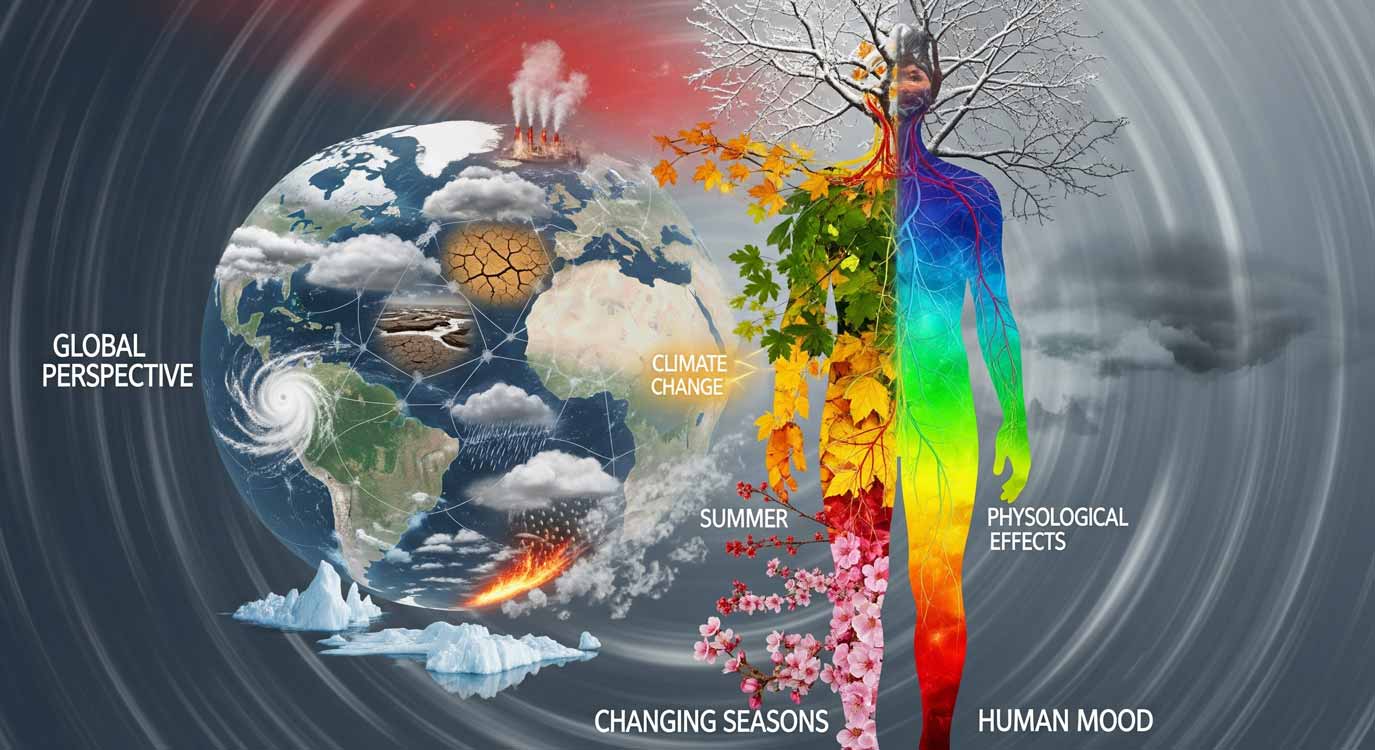Does your mozzarella refuse to stretch or just burn? The secret is science. From "pasta filata" to the crucial role...
Spring arrives, and suddenly you feel like running, laughing, and loving. Winter comes, and you feel down, sleep more, and get sad. Autumn arrives, and the smell of rain, the color of the leaves, and an old sense of nostalgia take over.
These are not just random feelings. They are deep, biological, and cultural responses that our body and psyche have to seasonal changes.
We humans think we are free, but we live in the palm of nature's hand. And nature issues a new command each season.
1. Our Body Has a Seasonal Clock
Inside every human brain, there is an invisible clock that is regulated by sunlight. This clock not only tells you when to sleep and when to wake up but also knows when to be happy, when to be sad, and when to have energy!
When the days get shorter, your body realizes that winter has come. It begins to secrete a hormone called melatonin — the sleep hormone. You sleep more, have less energy, and feel more tired. This is a natural response, not a weakness.
In contrast, when spring arrives and there's more light, your brain starts producing serotonin — the happiness hormone. Suddenly, you feel like going out, taking a walk with someone, and loving.
2. Seasons Affect Our DNA, Too
It's interesting to know that your genes also change with the seasons. It's not that your DNA changes, but how your genes are "turned on or off" changes with the season.
For example, in winter, genes related to the immune system become more active. Your body knows that there are more colds and viruses, so it strengthens your immunity.
In spring, genes related to metabolism and energy become more active. Your body is once again ready for movement, activity, and life.
3. Why Does Winter Make Us Sad?
It's not just you. Millions of people feel sad, tired, and apathetic in winter. Some just have "winter blues." Others suffer from something called Seasonal Affective Disorder (SAD).
The reason is simple: less light ← less serotonin ← less happiness.
But the interesting thing is: some people are the exact opposite. In summer, with the heat and humidity, they get anxiety, have trouble sleeping, and become irritable. This means the seasons don't affect everyone the same way.
4. Seasonal Colors Are the Colors of Our Emotions
Your eyes look at the yellow and orange leaves of autumn, and suddenly an old sense of nostalgia takes over. Or the smell of autumn rain intensely reminds you of a time in your life.
This doesn't just happen. It's a deep connection between sense and memory. Our brain connects the colors, smells, and sounds of each season to important memories.
- Spring Green: Associated with joy, rebirth, and love.
- Autumn Yellow and Orange: Nostalgia, warmth, and reflection.
- Winter White: Serenity, contemplation, sometimes isolation.
- Summer Blue: Freedom, adventure, energy.
5. Why Are Nowruz and Yalda So Deeply Felt?
Nowruz is not just a holiday. Yalda is not just a night. These are celebrations rooted in nature.
Nowruz is celebrated during the vernal equinox, the point of balance between light and darkness. Yalda is on the longest night of the year, where darkness reaches its peak, and we overcome it by gathering with family.
All cultures around the world have such celebrations: the Chinese celebrate the Spring Festival, the Japanese watch cherry blossoms, and Europeans defeat the darkness in winter with candlelight and Christmas trees.
These celebrations are not just culture. They are collective treatments for seasonal sadness.
6. Seasons Also Affect Society
| Phenomenon | Peak Season | Why? |
|---|---|---|
| Birth Rate | Autumn | Increased sexual activity in spring and summer |
| Mortality Rate | Winter | Cold, heart disease, depression |
| Social Activity | Summer | More light, higher energy |
| Desire to Marry | Spring | Season of rebirth and love |
7. What Have New Cities Done to Us?
In modern cities, there is light 24/7. We are no longer in sync with nature. Our biological clock is off. Winter arrives, but we are fooled by artificial light into thinking "everything is just like summer."
This is light pollution. And this pollution prevents our bodies from responding correctly to the seasons. Our sleep gets disrupted, our energy decreases, and our depression increases.
8. Climate Change: The Seasons Are Disappearing
Spring comes earlier. Winters become short and irregular. Rains shift. The seasons are no longer what they used to be.
This doesn't just affect nature. It affects us, too. When the seasons don't come correctly, our minds feel a sense of "wrongness." This phenomenon is called eco-anxiety — a chronic fear of losing nature's balance.
9. Syncing with Nature: How Can We Help Ourselves?
We can't stop the earth. But we can sync with it. By being aware that our bodies are deeply connected to the seasons, we can choose smart strategies to maintain physical and mental balance.
Practical Ways to Live in Harmony with the Seasons
- Go outside in the morning: Even if it's cloudy, natural light is the best regulator for your biological clock.
- Use light therapy: In winter, light therapy lamps can help compensate for the lack of sunlight.
- Connect with nature: Walking in a park, seeing the autumn leaves, smelling the rain — these are not just pastimes, but natural remedies for the body and soul.
- Take seasonal celebrations seriously: Nowruz, Yalda, or any ritual that has meaning for you — they are an opportunity to renew your connection with nature and family.
Natural Products: Our Companions in Seasonal Harmony
Our body has specific needs in each season. In winter, we need more energy and a stronger immune system. In spring, we need cleansing and renewal. In summer, we need to rebuild our strength. In autumn, we need fortification and preparation.
In this journey, bee products can be natural and smart companions:
- Natural Honey: A healthy and sustainable source of energy, a great alternative to artificial sugars that can help combat seasonal fatigue.
- Bee Pollen: Rich in vitamins, amino acids, and enzymes, it can strengthen your immune system, especially in cold seasons.
- Royal Jelly: With its unique combination of nutrients, it can help regulate energy, sleep, and cognitive function.
These products are not magic. But they are part of a natural lifestyle — a lifestyle in which we live in harmony with our body and nature.
Conclusion: Each Season, a Chance for Renewal
Each season brings out a different version of you. Listen to it. Befriend it. It is a part of you.
By being aware of the body's biological responses to seasonal changes, and by using natural remedies—from natural light to bee products—you can help your body harmonize with these changes and live the best version of yourself in every season.
Nature has extended its hand to us. All we need to do is take it.






















Latest comments